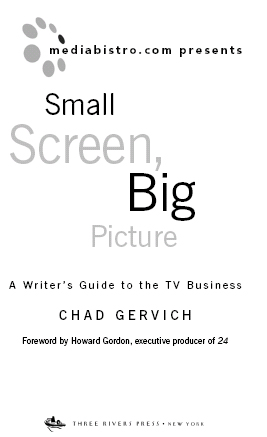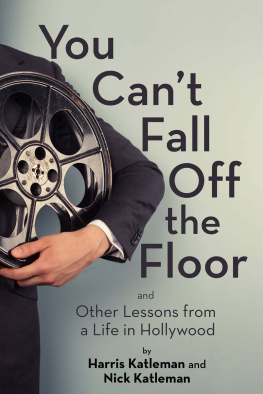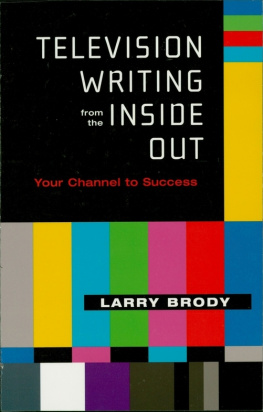

Contents

PART I
From the Inside Out How the Industry Is Structured
PART II
Development Season From Pitch to Pilot Pickup
PART III
Pilot Season From Pilot Pickup to Series
PART IV
Staffing Seasonand Beyond Getting the Series Up and Running
PART V
New Frontiers Where TV Is Headed
PART VI
Breaking In Your Guide to Infiltrating Hollywood
For Kelly,
who put up with all the sleepless nights,
neurotic breakdowns, and panicked rewrites.
I love you. Dont go anywhere.
Somewhere out there in space,
theres a huge black ball of nothingness
racing toward every television set in America.
Its our job to stop it.
WARREN LITTLEFIELD
Principal, The Littlefield Company
Foreword

by Howard Gordon
I remember being in a writers room about ten years ago, and someonea brilliant and famous writer whose name Ill keep to myself for nowrhapsodized about the exquisite ecstasy of the writing process. Dont you love it when you get lost inside the story, and the characters start speaking for themselves, and you look up and realize eight hours have passed? I nodded dumbly, and smiled. Because I had no idea what the fuck he was talking about.
Ive never had that experience. Never. Me, Im a grinder. And a second-guesser. Since I can remember, I have suffered from some undiagnosed combination of OCD and ADD that causes me to spend hours on a preposition. Which is a long-winded way to describe this simple truth: I hate writing. I really do. Even writing this foreword is excruciating. Every word weighs on me like a millstone. Every. Single. Word.
What makes the process even more excruciating is that I am my own worst critic. No one has more contempt for my work than me. So studio and network notes are usually a cakewalk. Whatever they dish out, chances are Ive already dished out for myself and come back for seconds.
So why do I write? Because as much as I hate writing, I love having written. All the pain suddenly falls away when the dialogue turns from a bunch of words under a character name into the living voices of real people, and the plot becomes more than just a series of events but a story worth telling. However we get there, if were lucky, eventually we get there. Word by word. Line by line.
I write because its the only thing Ive ever wanted to do. Not a day goes by that I dont appreciate what a privilege it is to be a member of this profession. I suppose in some way, being a writer is the buy-in that allows me to enjoy the company and respect of my fellow writers. To count so many professional writers as friends and colleagues is one of my proudest accomplishments. I may not enjoy the creative process as much as my unnamed colleague, but Id wager my WGA pension that I get every bit as much pleasure from my final draftwhich only makes me want to belly up to the laptop and do it all over again.
Writing and producing a television show is a mysterious craft, and we all bring to it our own unique energy and talent. But the business of making a television show is the common ground we all have to navigate. Youd think that after twenty-four years as a working writer, Id have figured out pretty much everything there is to know about the television business. But after reading Chad Gervichs book, I found that wasnt the case at all. In fact, I didnt know how little I knew until I read Small Screen, Big Picture.
This isnt just an operating manual for aspiring writers and executives; its for anyone whos ever wondered how television shows are born. Within these pages youll find a map of the twisted and thorny path an idea must travel before it becomes a script, then a pilot, and finally a television series; one that, more likely than not, will be canceled before its first season is even finished shooting. Youll discover that even after a writer is lucky enough to have beaten back the demons of his own self-doubt and written a script hes satisfied with, thats when the real adventure begins. Youll learn how to navigate though the minefield known as the development process and how to defend yourself against that fickle species known as the creative executive, whose opinions are sometimes helpful but can often deal the death blow to a project. Chad sobers us with the truth of how difficult a process it is, but he also gets us drunk with the hope that comes from the promise of creating a show that works. He is a storyteller and an insider whose love for television practically vibrates in every sentence.
Had there been a book like this when I started my career, I would have saved myself a lot of time. And the business has only gotten more confusingmuch more confusingthan when I started working as a writer. As the 2008 WGA strike demonstrated, the television business is changing faster than even the most forward-thinking pundits could have predicted. With the explosive growth of digital recorders and broadband and wireless platforms, the revenue models are being reconfigured at a dizzying pace. But none of it has gotten ahead of Chads understanding. He tells the reader exactly what to expect and when to expect it. Even if the craft of writing cant be learned, certain mistakes can be avoided with enough good information. And the information Gervich has gathered is as good as anything Ive ever read on the subject.
I wish Id written this book myself. Its the book I always told myself that Id write one day. But the truth is that Chad wrote it much better than I could ever have written it. So ultimately Im grateful to himnot just for educating me on a business I thought I understood, but for saving me so much time.
Enjoy Small Screen, Big Picture. If you love television, youll have a hard time putting it down.
Authors Note

I showed up at my first day of work at the Littlefield Companys Beverly Hills officesparking garage populated with Ferraris, walls covered with Lichtensteinswearing a shirt so new it still smelled like the Van Heusen outlet. It was 1999, and no one in L.A. had worn Van Heusen since 1883, but I didnt care. Or, more accurately, didnt know. I had my first job, and while it wasnt exactly a writing or producing gig, I was navely determined to be Joss Whedon by the end of the year.
Fresh out of UCLA grad school, I was starting as a development assistant at former NBC Entertainment president Warren Littlefields new TV production company. I had met Warren through an MFA mentoring program, but not only did I know nothing about how TV was bought, sold, produced, or distributed, I had no idea how to be an actual assistant.
As I learned to roll calls, write coverage, and keep my bosss calendar, one thing became painfully clear: there was a massive gulf between myself and the people around me. These people talked about overalls and if-comes and franchises and license fees. I wanted to talk about last nights
Next page













